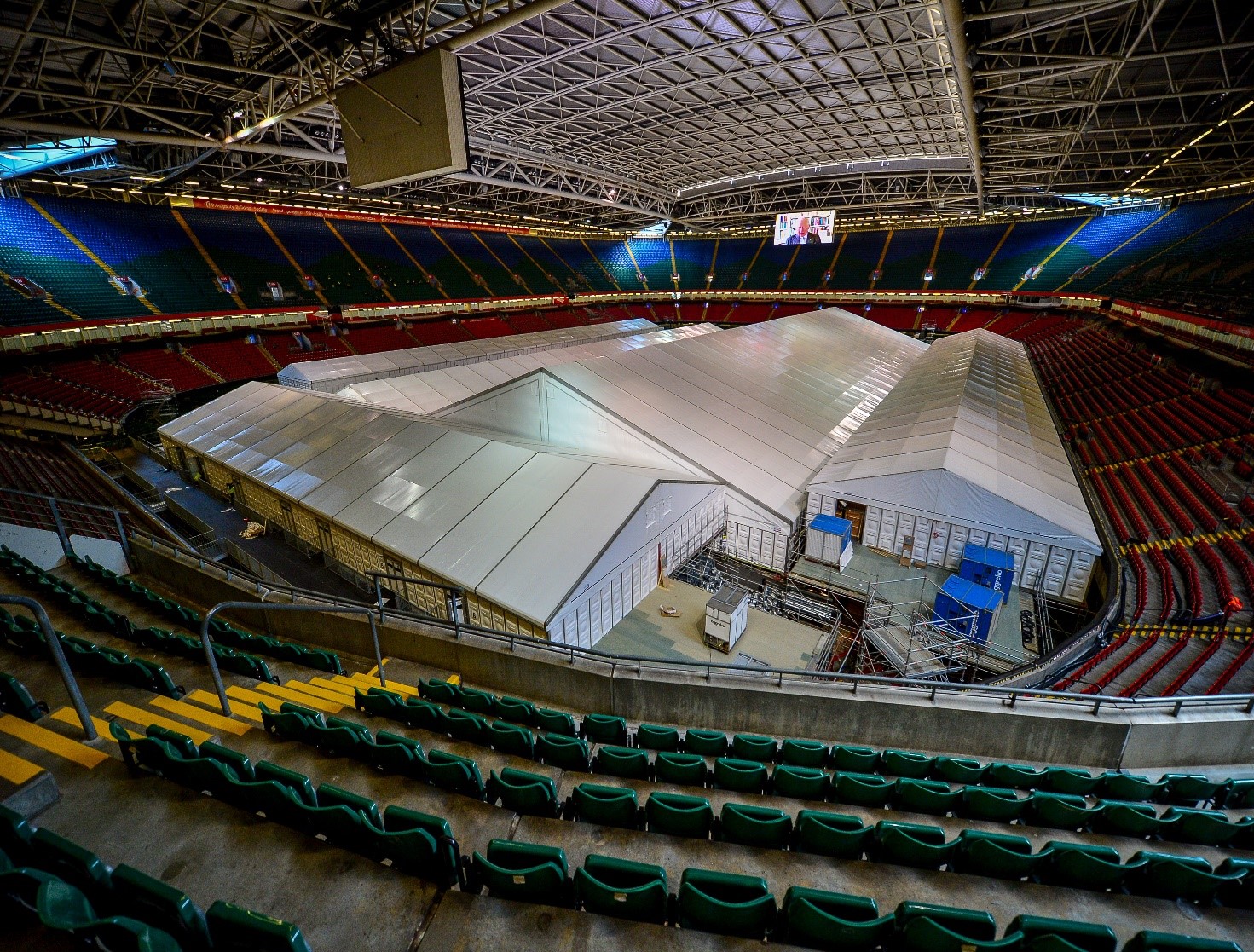High performance flexible crew for any eventuality.
Company number: 12208039

Cardiff’s Principality Stadium has long been one of our key venues. In recent years, we’ve run the builds and breaks for huge names, such as Take That, Spice Girls, Ed Sheeran, Pink, Beyonce and many more., Our crew also regularly transform the stadium from a sports venue to a music venue and vice versa. This time however, we’d be building something Principality Stadium has never seen before in its lifetime… a field hospital.
The hospital would have 2000 beds for patients coming towards the end of their Covid-19 treatment who require either rehabilitation and support for recovery or end-of-life palliative care. It would be the largest of its kind in Wales and the second largest in the UK, only after London’s Nightingale. The inspirationally named Dragon’s Heart Hospital / Ysbyty Calon Y Ddraig would be vital in the battle against the virus. This was set to be a mammoth task with time of the essence with teams working around the clock.
24/7 Event Crew were called upon to deliver two teams of multi skilled crew working 12-hour shifts day and night. This was our Cardiff crew working for the Welsh NHS, country pride was abundant as the crew threw themselves into every task. Event skills such as steel climbing, plant operators, carpet layers, set builders, marquee hands and just general labour proved invaluable in delivering the project on time.
The first job for the crew was to remove any obstructions which would impede on the initial stages of the build. This started with removing the carpet tiles and smaller, less useful furniture from the luxury viewing boxes, their adjoining corridors and all along that floor. Each floor is approximately one kilometre in length so this alone was a huge task. Our Crew Chief and Plant Training Instructor, Rhyddian, reported walking 30km on his first night shift alone! At least four truck-sized skips (the biggest around 40 cubic yards) were used to dispose of the carpet in a roll on roll off fashion. The mass of carpet tiles were placed neatly in the skips to maximise the available space. The crew continued to strip the stadium of all unnecessary items such as seats from the tiers around the bowl, the bars from floor 6 and the gates from the south side of the venue.
Whilst the two teams were removing non-essential items from the stadium, we also had a large number of crew on various other jobs too. Some of these roles included the distribution of fire extinguishers, barricading certain areas off to prevent unauthorised access and working with the riggers to build and hang the truss from which oxygen manifolds and extraction pipes could be hung- both inside and above the marquees that are on the pitch. The biggest of the 5 marquees is said to have a 50m span and be the largest in the UK!
ESG, who designed the site, have been utilising some more of our crew to change scaffolding brace configurations, fit ventilation shafts in the now accessible bays, work as carpenters and generally as the go-to guys for any last-minute adjustments throughout the stadium. Additional crew have been working alongside Set Square, who are the carpenters on the build, to create an area for an MRI machine and building nurses stations. We’ve also be working with the plumbers, MTD, distributing all of their kit throughout the stadium and to build sinks and pumps. On top of such a variety of crew on site, we also have catering assistants working in the kitchen to keep every person at the venue fed and refuelled to continue with their shift, a catering runner making numerous trips every day to the cash and carry and supermarkets to buy the produce to keep the kitchen topped up and crew manning the laundry room to do whatever possible to reduce the spread of the coronavirus.
An amazing piece of feedback we’ve received from site about one of the additional teams of 24/7 Crew…
“There has been (what is probably the hardest working team here – absolutely non-stop all day every day) Corrick’s team, working for Diagon, who have been the backbone of this build, run ragged every day. They are the Sherpas, the pack mules, the unstoppable unsung heroes who have distributed an uncountable number of trucks worth of kit all over site. Back and forth, up and down, here there and everywhere. And most importantly with a smile.
This hospital is being kitted out with 2000 hospital beds and each required at least two wooden back boards on which hooks, power and oxygen supplies are fixed. Corrick and his team have literally helped build every single bed station in this field hospital. And more!” (Rhyddian, Site Crew Chief).
The first 330 beds were made available after just 9 days, with the first patient being admitted on the 28th April, the hospital and its staff have now joined the war against the Coronavirus.